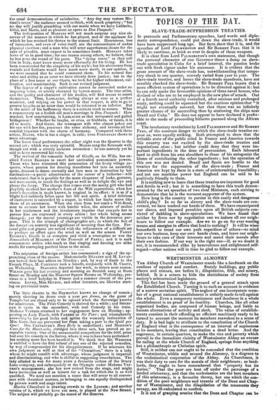TOPICS OF THE DAY.
SLAVE-TRADE-SUPPRESSION TREATIES.
IF protocols and Parliamentary speeches, hard words and diplo- matic correspondence, could put down the slave-trade, it would have been suppressed long ago. But facts show that it is, and the speeches of Lord PALMERSTON and Sir ROBERT PEEL that it is likely to continue, as brisk as ever in despite of these weapons. It is clear from Lord PALMERSTON'S own statement, that though the personal character of one Governor threw a damp on slave- trade speculation in Cuba for a brief interval, the passion broke out with fresh vigour under his successor. It is evident that the gross amount of the slave-trade has, notwithstanding that tempo- rary check in one quarter, scarcely varied from year to year. The slave-trade treaties, and hence the slave-trade squadrons, have not sensibly checked the slave-trade. Sir ROBERT PEEL boasts that a more efficient system of operations is to be directed against it : but he can only quote the favourable opinions of three naval heroes, who devised or who are to be employed in the new plan of attack. Out of a fourth naval authority consulted, after anxious and prolonged study, nothing could be squeezed but the cautious opinion that "it might not eventually succeed, but that there was an infinitely greater chance of its succeeding than by stationing the ships near Brazil and Cuba." He does not appear to have declared it prefer- able to the mode of proceeding hitherto pursued along the African coast.
The involuntary revelations by Lord PALMERSTON and Sir Rormax PEEL, of the constant danger to which the slave-trade treaties ex- pose us, were equally striking. Both attempted to show that the irritable state of the public mind in France and America towards this country was not excited by the slave-trade treaties and negotiations alone ; but neither could deny that they were im- portant ingredients in the dose of provocation. Each laboured hard to shift from his own shoulders to those of his antagonist the blame of contributing the other ingredients ; but the operation of this one was not denied. Brazil and Spain are hostile to the treaties for the suppression of the slave-trade ; France and America are kept by them in a state of unintermitting irascibility; and not one maritime power but England can be said to be positively friendly to them.
It is nothing new to learn that these treaties are impotent for good and fertile in evil ; but it is something to have this truth demon- strated by the set speeches of two rival Ministers, each striving to demonstrate that he is the warmest supporter of the system.
How long is the country to persist in this costly and dangerous child's play ? In so far as slavery and the slave-trade are con- cerned, we have washed our hands of them. We have emancipated our slaves, and imposed penalties upon all British subjects con- victed of dabbling in slave-speculations. We have found that neither by force nor by negotiation can we induce all our neigh- bours to follow our example. Are we to go on for ever wasting means and energies in efforts that lead to nothing? It will be wiser henceforth to tread our own path regardless of others—to mind our own business, keep our own bands clean, and leave our neigh- bours to take care of their interests and mend their morals after their own fashion. If our way is the right one—if, as we doubt it not, it is recommended alike by benevolence and enlightened self- regard—other
nations will in time be glad to follow our example.


























 Previous page
Previous page